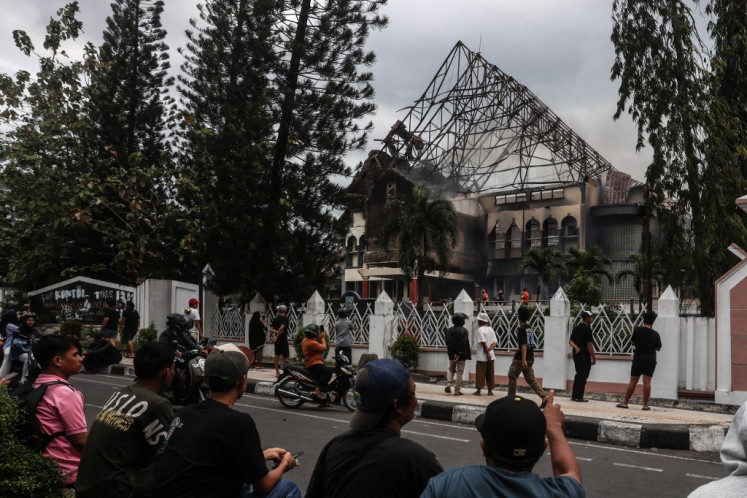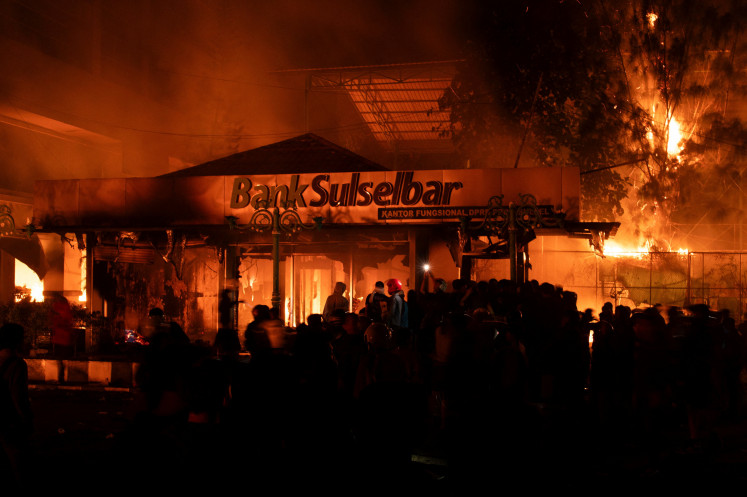Popular Reads
Top Results
Can't find what you're looking for?
View all search resultsPopular Reads
Top Results
Can't find what you're looking for?
View all search resultsHigh logistics costs still harming RI competitiveness
With the poor condition of infrastructure and high logistics costs, it will be difficult for Indonesian industries to compete with their ASEAN peers, especially when the common market agreement comes into effect in the region, according to the Indonesian Logistics and Forwarders Association (ALFI)
Change text size
Gift Premium Articles
to Anyone
W
ith the poor condition of infrastructure and high logistics costs, it will be difficult for Indonesian industries to compete with their ASEAN peers, especially when the common market agreement comes into effect in the region, according to the Indonesian Logistics and Forwarders Association (ALFI).
ALFI chairman Iskandar Zulkarnain said in Jakarta on Tuesday that with the current condition of infrastructure, the ASEAN single market slated to begin at the end of 2015 could become a threat instead of an opportunity for Indonesian companies.
The National Logistics Blueprint (Sislognas) of 2010-2025, launched three years ago to improve transportation facilities, would provide significant assistance because the program did not work as expected, he said.
'We will enter an era where we will see a free flow of goods, labor skills and investments. We will have to increase our capacity in order to compete with other nations,' Iskandar said during an ALFI national meeting on Monday.
ASEAN ' which includes Indonesia, Malaysia, the Philippines, Singapore, Thailand, Brunei, Vietnam, Laos, Myanmar and Cambodia ' agreed in 2007 to establish the ASEAN Economic Community. The free trade agreement will be fully implemented at the end of 2015 by all member countries except Cambodia, Laos, Myanmar and Vietnam, which will fully participate by 2018.
Indonesian industrial manufacturers have also voiced their concerns over the implementation of the so-called single market. In addition to poor transportation facilities, the high lending rates charged by local banks are another factor that could make Indonesian firms uncompetitive.
Based on a 2013 study by business consulting firm Frost & Sullivan, Iskandar said that the country's logistics transaction value reached Rp 287 trillion (US$25.41 billion) last year, with a growth of 11 percent per year.
'This indicates both opportunity and challenge, as a lot of foreign forwarders eye this big opportunity, especially approaching the ASEAN economic community,' he continued.
Iskandar said that the government should immediately improve its approach to the issue, including providing fiscal incentives to improve the logistics sector's performance, as well as focusing more on constructing new ports instead of land infrastructure.
'Despite of spending a lot of money on the Sunda Strait Bridge, the government should be investing its money on constructing more seaports,' Iskandar said. 'Based on our study, it is more efficient to ship goods rather than carry them over land,' he continued.
According to the Industry Ministry's director general of industrial zoning, Imam Haryono, the 2013 World Economic Forum's global competitiveness report ranked Indonesia in 38th position out of 148 countries.
Imam said even though the ranking had increased from the previous year, Indonesia again achieved a low score for its infrastructure indicator, for which the country was in 82nd place among the same countries.
'Our low score on the infrastructure indicator directly reflects the high cost of logistics,' Imam said.
He said that data from the Industry Ministry shows that Indonesia's logistics accounted for 23.6 percent of the country's current gross domestic product (GDP).
'This is far higher than other countries such as the United States that reached only 9.9 percent, Japan with 10.6 percent and South Korea with 16.3 percent,' Imam said.
In its 2012 Logistics Performance Index (LPI), the World Bank ranked Indonesia in 59th position with a score of 2.94, far below its fellow ASEAN members, such as Singapore, Malaysia and Thailand that ranked 1st, 29th and 38th, respectively.
The Transportation Ministry has targeted to decrease the national logistics cost by 3 percent and to increase the LPI score to 3.1 by 2015.










